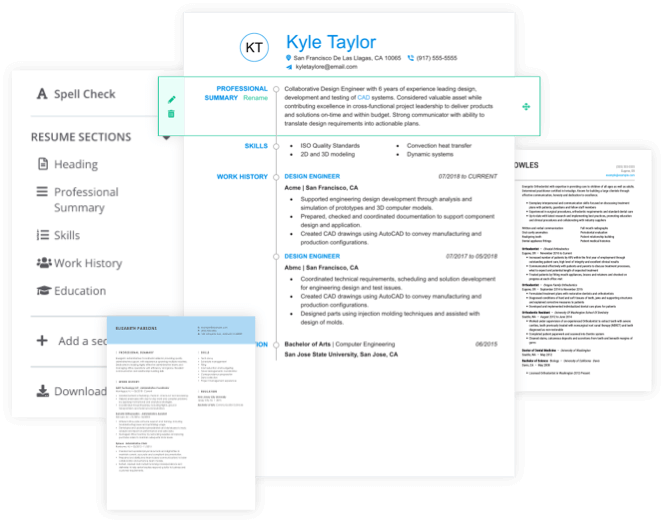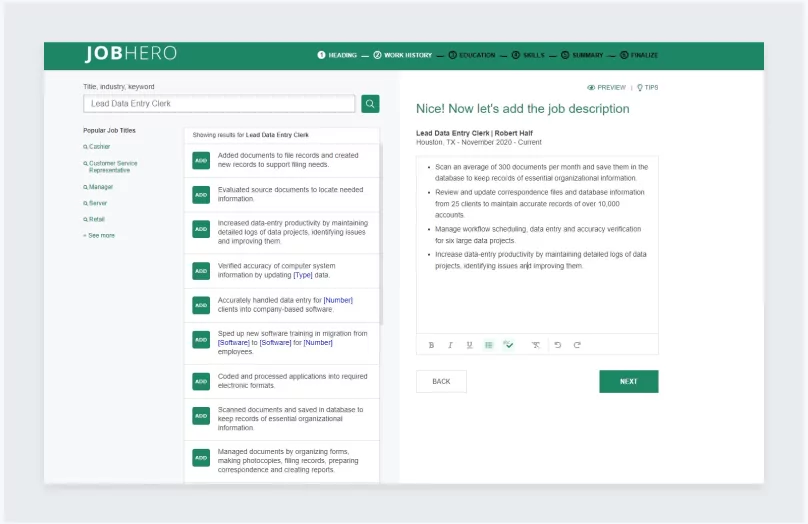- Featured in:

Truck loaders prepare shipments and freight deliveries by carefully loading and securing shipments on tractor trailers for local, regional, and national deliveries. Additionally, truck loaders assist with offloading materials upon delivery and assisting drivers with connecting docks, hoses, and pipes to efficiently transfer materials to warehouses or holding tanks.
In this role, truck loaders may use a wide variety of tools and machinery to support loading and unloading activities, including forklifts and cranes. Most truck loaders work within teams to quickly and efficiently load and unload trucks while maintaining loading dock safety and ensuring that materials are protected in transit.
Studying resume examples is a great way to get inspiration for your own. Study our library of example today!
Boost your resume with an extra click. Our cover letter templates match our resume templates’ designs for a cohesive application. Use a template in our builder to help you quantify and expand upon the experience from your resume and impress employers.
Truck Loader Duties and Responsibilities
While truck loaders can work in a variety of industries, most share several essential duties:
Load and Offload Materials by Hand
The primary duty of a truck loader is loading shipments on tractor trailers and taking shipments off of trucks upon arrival. This aspect of the role can involve using hand trucks to load individual packages, bundling shipments together prior to loading, and moving incoming shipments from the truck to a warehouse. Truck loaders often need to carry heavy boxes between a loading dock and truck bed.
Connect Pipes, Hoses, and Docks
In many cases, truck loaders need to connect various equipment to trucks to load materials. For example, a truck loader who works with liquids may need to connect hoses from a main tank to an intake port on a tanker truck, ensuring that connections are secure and properly sealed to prevent leaks. In other cases, a truck loader may need to connect a docking mechanism to the back of a truck.
Operate Loading and Unloading Equipment
For heavier materials, truck loaders need to use loading equipment and machinery to load shipments. This can include using forklifts to transport and place pallets and operating cranes to load heavy products and materials on trucks. For materials that are transported loose, such as stones, a truck loader may need to operate a loader to fill the truck.
Secure Materials in Tractor Trailers
Truck loaders are also responsible for securing materials for shipment. This typically involves following best practices for packing trucks as well as using materials to prevent items from shifting in transit. In this aspect of the role, truck drivers need to consider both the security of shipments and the ease of offloading when the materials reach their destination.
Maintain Loading and Unloading Records
Finally, truck loaders need to maintain records of items, materials, and products that they load and offload. This can include checking shipping manifests during offloading to ensure that all expected materials have arrived as well as preparing detailed loading records that indicate materials and quantities. Truck loaders may need to collect a driver’s signature and submit these records to supervisors.
Truck Loader Skills and Qualifications
Truck loaders operate machinery and load items by hand onto trucks for a variety of industries. Most workers in this role have at least a high school diploma and the following skills:
Physical strength – truck loaders should be able to lift and carry heavy loads and safely place them on truck beds, so physical strength is essential in this role
Stamina – working in this role can be exhausting and repetitive, requiring long shifts spent performing physical activities, so truck loaders should also possess a high level of stamina
Safety focus – truck loaders should have extensive familiarity with safety protocols and best practices, particularly if they are involved in loading and transporting hazardous or heavy materials
Communication skills – effective verbal communication is essential in this role, as is the ability to complete loading reports for submission to supervisors
Team collaboration – truck loaders tend to work with teams of loaders, so effective collaboration and coordination between team members is also vital
Time management skills – because truck loaders need to ensure that trucks are prepared for departure according to schedule, they also need to be able to effectively manage their time
Tools of the Trade
Truck loaders tend to work in distribution centers and loading docks, and should be comfortable using:
Loading machinery (forklifts, cranes)
Truck Loader Education and Training
There are no formal education requirements to work as a truck loader. Most workers in this role have a high school diploma. Certification on loading machinery such as forklifts can be very helpful, although it is possible to obtain certification on the job. There are many opportunities for on-the-job training in this role as truck loaders gain familiarity with tools and best practices.
Truck Loader Salary and Outlook
The Bureau of Labor Statistics (BLS) categorizes truck loaders in the larger category of tank car, truck, and ship loaders. As of May 2017, the BLS found that workers in this field earned a median annual salary of $36,860. The highest-paid 10 percent of tank car, truck, and ship loaders earned more than $66,180 per year, while the lowest-paid workers in these roles earned less than $23,700 annually.
While the BLS does not provide employment outlook information for this role, O*Net data indicates that this field will grow at an average pace of five to nine percent between 2016 and 2026.

Helpful Resources
“Best Practices for Loading Dock Safety”
this blog post examines loading dock safety, providing advice for preventing injuries and accidents while using mechanical loading tools and packing freight by hand.
Preventing Damage to Household Goods within Freight Trailers: Innovative Tips, Hints, and Strategies for Maximum Space Usage & Damage Prevention
by Walt S. Smith - while this book focuses on household goods, it features helpful advice and guidance for all truck loaders.
“4 Best Practices to Ship Truckload Freight”
this blog post explores efficient shipping strategies, including building and packing shipments to reduce loading times and take advantage of the full capacity of a truck.
Practical Cargo Securement: Guidelines for Driver, Carriers & Shippers
by Rolf VanderZwaag - read this comprehensive guidebook to learn how to secure cargo for long-haul deliveries and ensure that items arrive intact.




